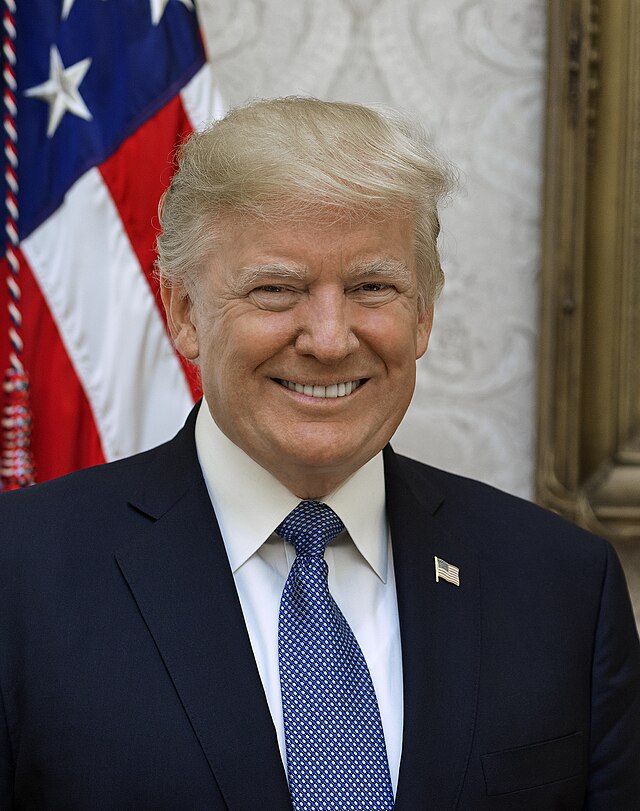Content deleted Content added
Tag: Reverted |
|||
Line 65: [[Political positions of Donald Trump|Trump's political positions]] have been described as [[populist]], [[protectionist]], [[isolationist]], and [[nationalist]]. He entered the [[2016 United States presidential election|2016 presidential race]] as a [[Republican Party (United States)|Republican]] and was elected in a surprise [[United States Electoral College|Electoral College]] victory over [[Democratic Party (United States)|Democratic]] nominee [[Hillary Clinton]] while [[List of United States presidential elections in which the winner lost the popular vote|losing the popular vote]].{{efn|name=electoral-college|Presidential elections in the United States are decided by the [[United States Electoral College|Electoral College]]. Each state names a number of electors equal to its representation in [[United States Congress|Congress]], and (in most states) all delegates vote for the winner of the local state vote. Consequently, it is possible for the [[President-elect of the United States|president-elect]] to have received fewer votes from the country's total population (the popular vote). This situation has occurred [[United States presidential elections in which the winner lost the popular vote|five times since 1824]].}} He became [[List of presidents of the United States by age|the oldest]] first-term U.S. president{{efn|name=age|[[Ronald Reagan]] was older upon his second-term inauguration, and upon being inaugurated in 2021, President-elect [[Joe Biden]] will replace both as the oldest president ever to serve.<ref name=oldest>{{Cite news |last=Peter |first=Josh |date=2020-11-05 |title=Joe Biden will become the oldest president in American history, a title previously held by Ronald Reagan |url=https://www.usatoday.com/story/news/politics/2020/11/05/oldest-president-joe-biden/6181672002/ |access-date=2020-11-18 |website=[[USA Today]]}}</ref>}} and the first without [[List of presidents of the United States by previous experience|prior military or government service]]. His election and policies have sparked [[Protests against Donald Trump|numerous protests]].<!-- DO NOT CHANGE this sentence without prior consensus; see [[Talk:Donald Trump#Current consensus]], item 20. --> Trump has made [[Veracity of statements by Donald Trump|many false and misleading statements]] during his campaigns and [[Presidency of Donald Trump|presidency]], to a degree unprecedented in American politics.<!-- DO NOT CHANGE this sentence without prior consensus; see [[Talk:Donald Trump#Current consensus]], item 49. --> Many of his [[Racial views of Donald Trump|comments and actions]] have been characterized as racially charged or racist.<!-- DO NOT CHANGE this sentence without prior consensus, see [[Talk:Donald Trump#Current consensus]], item 30. --> During his presidency, Trump ordered [[Executive Order 13769|a travel ban]] on citizens from several Muslim-majority countries, citing security concerns; after [[Legal challenges to the Trump travel ban|legal challenges]], the Supreme Court upheld [[Presidential Proclamation 9645|the policy's third revision]].<!-- DO NOT CHANGE this sentence IN ANY WAY without prior consensus; see [[Talk:Donald Trump#Current consensus]], item 23. --> He enacted [[Tax Cuts and Jobs Act of 2017|a tax-cut package]] for individuals and businesses, rescinding the [[individual shared responsibility provision|individual health insurance mandate]] penalty of the [[Affordable Care Act]] (ACA), but has [[American Health Care Act of 2017|failed to repeal and replace]] the ACA as a whole. He appointed [[Neil Gorsuch]], [[Brett Kavanaugh]] and [[Amy Coney Barrett]] to the [[Supreme Court of the United States|Supreme Court]]. In foreign policy, Trump has pursued an [[America First (policy)|America First]] agenda, renegotiating the [[North American Free Trade Agreement]] (NAFTA) as the [[United States–Mexico–Canada Agreement]] (USMCA) and withdrawing the U.S. from the [[Trans-Pacific Partnership]] trade negotiations, the [[Paris Agreement]] on [[climate change]], and the [[United States withdrawal from the Joint Comprehensive Plan of Action|Iran nuclear deal]]. He [[Trump tariffs|imposed import tariffs]] which triggered [[China–United States trade war|a trade war with China]], [[United States recognition of Jerusalem as capital of Israel|moved the U.S. embassy in Israel to Jerusalem]], and [[American-led intervention in the Syrian Civil War#Withdrawal from north Syria|withdrew U.S. troops from northern Syria]]. He met three times with North Korean leader [[Kim Jong-un]], but talks on [[denuclearization]] broke down in 2019. A [[Special Counsel investigation (2017–2019)|special counsel investigation]] led by [[Robert Mueller]] found that Trump and his campaign benefited from [[Russian interference in the 2016 United States elections|Russian interference in the 2016 presidential election]], but did not find sufficient evidence to press charges of [[criminal conspiracy]] or coordination with Russia.{{efn|name=coordination|Mueller, Robert (March 2019). [https://www.justice.gov/storage/report.pdf "Report on the Investigation into Russian Interference in the 2016 Presidential Election"]. '''I'''. p. 2. "In connection with that analysis, we addressed the factual question whether members of the Trump Campaign 'coordinat[ed]'{{snd}}a term that appears in the appointment order{{snd}}with Russian election interference activities. Like collusion, 'coordination' does not have a settled definition in federal criminal law. We understood coordination to require an agreement{{snd}}tacit or express{{snd}}between the Trump Campaign and the Russian government on election interference. That requires more than the two parties taking actions that were informed by or responsive to the other's actions or interests. We applied the term coordination in that sense when stating in the report that the investigation did not establish that the Trump campaign coordinated with the Russian government in its election interference activities." }} Mueller also investigated Trump for [[obstruction of justice]], and [[Mueller Report|his report]] neither indicted nor exonerated Trump on that offense. Trump later pardoned five people who were convicted as a result of the Russia investigation. After Trump [[Trump–Ukraine scandal|solicited Ukraine to investigate]] his political rival [[Joe Biden]], the House of Representatives [[Impeachment of Donald Trump|impeached him]] in December 2019 for [[abuse of power]] and [[obstruction of Congress]]. The Senate [[Impeachment trial of Donald Trump|acquitted him]] of both charges in February 2020. | |||
 Article Images
Article Images